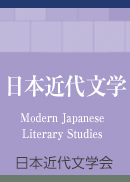Volume 102
Displaying 1-34 of 34 articles from this issue
- |<
- <
- 1
- >
- >|
KEYNOTE SPEECH
-
2020 Volume 102 Pages 1-22
Published: May 15, 2020
Released on J-STAGE: May 15, 2021
Download PDF (622K)
ARTICLES
-
2020 Volume 102 Pages 23-38
Published: May 15, 2020
Released on J-STAGE: May 15, 2021
Download PDF (578K) -
2020 Volume 102 Pages 39-54
Published: May 15, 2020
Released on J-STAGE: May 15, 2021
Download PDF (492K) -
Poetry as a Production Space: Terayama Shūji's Literary Column in the Test-Prep Magazine Ko-3 Course2020 Volume 102 Pages 55-70
Published: May 15, 2020
Released on J-STAGE: May 15, 2021
Download PDF (496K) -
2020 Volume 102 Pages 71-86
Published: May 15, 2020
Released on J-STAGE: May 15, 2021
Download PDF (410K)
PROSPECTA
-
2020 Volume 102 Pages 87-94
Published: May 15, 2020
Released on J-STAGE: May 15, 2021
Download PDF (339K) -
2020 Volume 102 Pages 95-100
Published: May 15, 2020
Released on J-STAGE: May 15, 2021
Download PDF (402K) -
2020 Volume 102 Pages 101-107
Published: May 15, 2020
Released on J-STAGE: May 15, 2021
Download PDF (327K) -
2020 Volume 102 Pages 108-113
Published: May 15, 2020
Released on J-STAGE: May 15, 2021
Download PDF (257K)
-
2020 Volume 102 Pages 114-117
Published: May 15, 2020
Released on J-STAGE: May 15, 2021
Download PDF (237K) -
2020 Volume 102 Pages 118-121
Published: May 15, 2020
Released on J-STAGE: May 15, 2021
Download PDF (276K) -
2020 Volume 102 Pages 122-125
Published: May 15, 2020
Released on J-STAGE: May 15, 2021
Download PDF (277K) -
2020 Volume 102 Pages 126-129
Published: May 15, 2020
Released on J-STAGE: May 15, 2021
Download PDF (327K) -
2020 Volume 102 Pages 130-133
Published: May 15, 2020
Released on J-STAGE: May 15, 2021
Download PDF (274K) -
2020 Volume 102 Pages 134-137
Published: May 15, 2020
Released on J-STAGE: May 15, 2021
Download PDF (258K) -
2020 Volume 102 Pages 138-141
Published: May 15, 2020
Released on J-STAGE: May 15, 2021
Download PDF (263K) -
2020 Volume 102 Pages 142-145
Published: May 15, 2020
Released on J-STAGE: May 15, 2021
Download PDF (263K) -
2020 Volume 102 Pages 146-149
Published: May 15, 2020
Released on J-STAGE: May 15, 2021
Download PDF (240K) -
2020 Volume 102 Pages 150-153
Published: May 15, 2020
Released on J-STAGE: May 15, 2021
Download PDF (227K)
-
2020 Volume 102 Pages 154
Published: May 15, 2020
Released on J-STAGE: May 15, 2021
Download PDF (114K) -
2020 Volume 102 Pages 155
Published: May 15, 2020
Released on J-STAGE: May 15, 2021
Download PDF (147K) -
2020 Volume 102 Pages 156
Published: May 15, 2020
Released on J-STAGE: May 15, 2021
Download PDF (131K) -
2020 Volume 102 Pages 157
Published: May 15, 2020
Released on J-STAGE: May 15, 2021
Download PDF (126K) -
2020 Volume 102 Pages 158
Published: May 15, 2020
Released on J-STAGE: May 15, 2021
Download PDF (130K) -
2020 Volume 102 Pages 159
Published: May 15, 2020
Released on J-STAGE: May 15, 2021
Download PDF (126K) -
2020 Volume 102 Pages 160
Published: May 15, 2020
Released on J-STAGE: May 15, 2021
Download PDF (131K) -
2020 Volume 102 Pages 161
Published: May 15, 2020
Released on J-STAGE: May 15, 2021
Download PDF (116K) -
2020 Volume 102 Pages 162
Published: May 15, 2020
Released on J-STAGE: May 15, 2021
Download PDF (139K) -
2020 Volume 102 Pages 163
Published: May 15, 2020
Released on J-STAGE: May 15, 2021
Download PDF (131K) -
2020 Volume 102 Pages 164
Published: May 15, 2020
Released on J-STAGE: May 15, 2021
Download PDF (126K) -
2020 Volume 102 Pages 165
Published: May 15, 2020
Released on J-STAGE: May 15, 2021
Download PDF (131K) -
2020 Volume 102 Pages 166
Published: May 15, 2020
Released on J-STAGE: May 15, 2021
Download PDF (147K) -
2020 Volume 102 Pages 167
Published: May 15, 2020
Released on J-STAGE: May 15, 2021
Download PDF (125K) -
2020 Volume 102 Pages 168
Published: May 15, 2020
Released on J-STAGE: May 15, 2021
Download PDF (113K)
- |<
- <
- 1
- >
- >|
